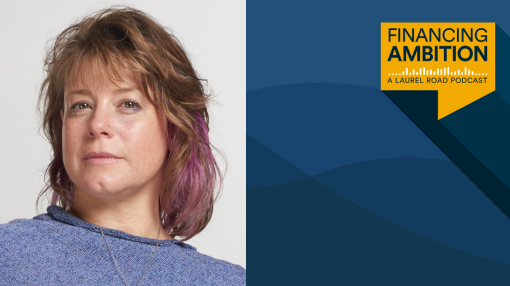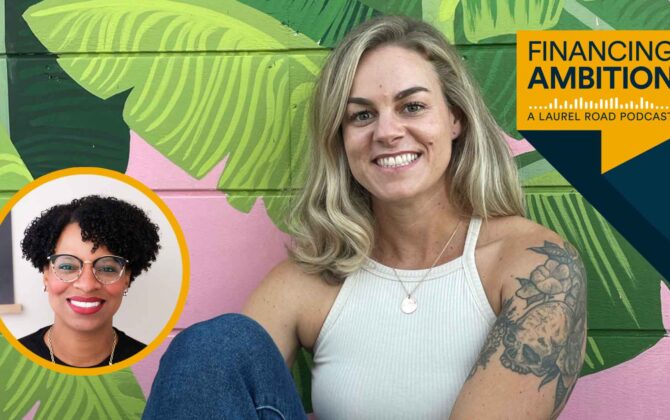Talking Public Service Loan Forgiveness (PSLF) for Nurses
Kimberly McClellan, EdD, is an Adjunct Clinical Professor at Drexel University College of Nursing and Health Professions. She joins us to discuss the Public Service Loan Forgiveness (PSLF) program and how nurses can take advantage of it as they pursue advanced degrees and serve the patient communities that need them most.

Hosts:
Eric Sutton, Laurel Road Head of Design & Content
Guests:
Kim McClellan, EdD, Adjunct Clinical Professor at Drexel University College of Nursing and Health Professions
Season 2, Episode 7
In this episode, we’re joined by Kimberly McClellan, EdD, Adjunct Clinical Professor at Drexel University College of Nursing and Health Professions, to discuss student loan forgiveness for nurses. Kim had $69,000 in student loan debt forgiven through the Public Service Loan Forgiveness (PSLF) program, and she shares how our student loan specialists helped her get there.
*Note: This episode mentions the the deadline for the One-Time Income-Driven Repayment (IDR) Account Adjustment being the end of 2023. Since this recording, the deadline has been extended.*
Transcript
Eric Sutton [00:00:02] Hi, everyone. This is Eric, and you’re listening to Financing Ambition, a Laurel Road podcast. On today’s episode, I’m joined by nurse practitioner Kim McClellan to talk about Public Service Loan Forgiveness (PSLF) for nurses.
If you’re unfamiliar with PSLF, it’s a federal student loan program available to borrowers who work within the government or at qualifying nonprofit organizations. Earlier this season, we talked with three doctors who achieved forgiveness through PSLF, and today I’m looking forward to shining a light on how student debt affects nurses and how this program might help.
Kim had her student loan debt forgiven through PSLF, and I’m happy to say, she worked with one of our student loan specialists at GradFin¹ to get there. So Kim, welcome to the Financing Ambition podcast, and thank you for being here with us today.
Kim McClellan [00:01:03] Thank you for having me join you.
Eric Sutton [00:01:05] All right. So, let’s get started with a quick introduction for our listeners, if you don’t mind. I’m sure everyone would love to know where you’re based, where you went to school and did your training, and particularly how much you had forgiven through PSLF.
Kim McClellan [00:01:20] Sure. So, I’m based here in the Philadelphia area. I started out, as many nurses do, with an associate degree RN. Worked a lot in hospital systems, went on to complete my bachelor’s degree and then subsequently my master’s in nursing, where I was able to become a nurse practitioner, both family nurse practitioner and women’s health nurse practitioner. It’s not uncommon for nurses to continue along that path. We we tend to start our our education and our careers and then move along to wherever the patients and our mission leads us. To that note, I then realized that there was such a shortage in nursing faculty, which of course impacts how many nurses we can have out in the community as well. So I became a professor, got my doctorate in education, and then my last educational achievement was to be able to become a psych nurse practitioner because of the mental health crisis that’s happening in our country now.
Eric Sutton [00:02:35] That’s awesome. That’s quite a story. And a lot of education.
Kim McClellan [00:02:39] A lot. Yeah. And that did lead me to quite a bit of debt, as you can imagine. So, I had approximately $69,000 of student loan debt forgiven because GradFin was able to assist me through the Public Service Loan Forgiveness Program.
Eric Sutton [00:02:58] Wow. Wow. $69,000. That’s great. And it’s interesting to learn more about your background as an advanced practice nurse (APRN) too. So, thank you for that. Before we get into the conversation any deeper, I just want to share some quick statistics for our listeners so that they can get a sense of the financial journey that nurses like yourself go through on the way to becoming an advanced practice nurse. So the average cost of a Bachelor of Science degree in nursing (BSN) is between $8,000 and $55,000. And the average student loan debt for a BSN student is approximately $24,000. Now to get a Master of Science degree in nursing (MSN), you’re looking at an average cost of 35,000 to $70,000, with the average student loan debt for an MSN student at a little over $47,000. And finally, for DNP, which stands for a Doctor of Nursing Practice, the highest level of nursing education, you’re looking at up to $254,000 for that degree. And the average student loan debt for nurse practitioner students is currently at $185,000.
Hopefully that gives listeners an idea of the student loan burden that we’re talking about here in that most advanced practice nurses have before Kim and I get back into her personal story. Okay. So, Kim, let’s get right into how you manage your student loan debt and we’re able to have that nearly $70,000 forgiven. I know from prior conversations that you had a bit of a difficulty finding the information you needed about how to qualify for that forgiveness amount. And then you stumbled upon GradFin. And I know the PSLF program is notoriously complex with frequently changing rules and requirements and just it’s a lot to navigate. So can you talk a little bit about that and how you ended up hearing about GradFin?
Kim McClellan [00:05:00] Sure, I’d love to. Yes. So, as you already mentioned, Eric, the PSLF program – that’s not new. However, the waiver was something that was new. And so I did know a bit about the PSLF program, but really, until I was able to find out about GradFin and how they can assist, and I found this out through a webinar that was put on and then advertised through the American Nurses Association, which I’m a member. Prior to that, I really had not thought that this program was going to work for me. I had spent over 25 years in the public realm of care, community care. I worked for, as I said, over 25 years in positions that would normally qualify someone for PSLF, but the problem is, and I’m not unique here, is that through many years and many loans and many school programs, my loans continually were placed with other lenders and moved without really my understanding into these predatory loans. So every time that happens, your loan, even though you may have worked for 5 or 10 years, your loans could move into an entity that are there not any longer qualifying for these 120 payments, as you mentioned. And often it’s not really known to the person who has the loan that this is even happening, if that makes sense. So you’re lost kind of in this system with no one really to help you navigate. When I found out about the program that the ANA was sponsoring through GradFin, I did listen in. But I have to admit, I was not hopeful because of all my years of experience that this was just another program that was not going to work for me.
Eric Sutton [00:07:11] Yeah, I’ve heard that before, actually. And before you go on, I just want to give some quick background information for our listeners around the limited PSLF waiver that you mentioned, just to make sure everybody can keep up with us. That PSLF waiver was a temporary change to the PSLF program rules and that allowed borrowers to receive credit for past periods of repayment or deferment that otherwise wouldn’t have qualified toward PSLF. And that waiver, that limited PSLF waiver ended on October 31st, 2022. So, Kim, I’m very happy for you that you were able to get in there before that expired. Now, this is not to be confused with the one time account adjustment for folks enrolled and Income-Driven Repayment (IDR), another federal program available through the end of 2023, which we discussed in a couple of previous episodes with GradFin’s Chris Walters and Joseph Price-Gault. The one time IDR adjustment that was meant to help correct program inconsistencies so that more federal borrowers could also get credit where credit was due. So in my case, being able to take advantage of that one time IDR payment amounted to a pretty significant forgiveness. And it sounds like in your case that temporary or limited PSLF waiver had a big financial impact for you, too.
Kim McClellan [00:08:31] It absolutely did. GradFin was able to help me navigate through this PSLF waiver program and really helped me to understand how this program is different than all the others that I just always would find out that I didn’t qualify for. There was certainly a way, and there is some work to it, but with GradFin, I had someone help me and advocate in a way that I was able to navigate the program, put all of the the loans absolutely into an entity that would qualify, and then be able to have credit for all the payments that I had made. I had spent 25 years paying for my loan. So it was nice to have someone help me find a way to actually document that, navigate a very difficult system that’s really set up to not be so helpful.
Eric Sutton [00:09:21] Yeah. And it sounds like you got educated about the about the program with that first GradFin consultation, but it seems like your experience working with GradFin beyond that consultation also was really helpful, which is great to hear. It sounds like it’s a lot of moving parts, you know, to keep track of. So I’m curious, you mentioned a little bit about this, but exactly how much did you know about PSLF and in general before you had that first consultation? I know you said you you didn’t think you would qualify for it, but did you know how complex it actually was? Did you know it was even among your choices? And if so, did you know just how deep it was in terms of the required paperwork, etc.?
Kim McClellan [00:10:14] I didn’t, actually. And, I knew, obviously, the complexity was something that kept shutting me out. But but, you know, the system is really somewhat set up that you only find out the next step after you go through three prior steps, you know, So if you never are able to get past that because you don’t really have someone to help you navigate it, you never really get the whole picture. So that is something that that having an advocate and a very knowledgeable entity like a GradFin counselor helped me navigate and learn the complexities and actually how to make them a bit more simplified.
Eric Sutton [00:10:58] Got it. That’s great. So, you know, one thing I know you and I both know, Kim, is that nursing school enrollment is not growing fast enough to meet what is the projected demand for nursing services? Both our RNs and APRNs. In fact, the American Association of Colleges of Nurses reports drops in both PhD and Master’s nursing programs by 0.7% and 3.8% respectively. So I wonder if, you know, nurses not knowing about PSLF is a factor in that drop off. And I know you work with many early career nurses. What is your sense of their awareness level of PSLF? Are they in the dark much like you were, you think?
Kim McClellan [00:11:43] I really do believe they are. Yes. And I think it does, as you noted, it does absolutely have an impact on how many students decide to go into nursing as a career. You know, we tend to be as nurses, highly educated, but not always highly compensated for for our level of education. So to take on this type of debt is daunting for anyone. But if you’re not quite sure how you’re going to pay that debt, you know, we always have jobs as nurses, but they don’t always pay us in a way that we can, you know, acquire this debt and feel like we can also take care of that. So and especially I would say this is true of nurses who are driven into the community setting, which is really where the profession is going. You know, there’s such a community need, there’s such a population health focus now in our profession. And for a nurse to decide to take that on as a mission, especially with the mental health crisis and the substance abuse crisis happening, you’re going to work in settings that there’s such a need, but not necessarily a way to to compensate or forgive some of these loans in the employer arena. So I think, you know, nurses don’t necessarily know about this. And this really what we’re talking about is the whole reason that the PSLF program was even created is to drive medical professionals, including nurses, into the community where there’s such a need and there’s such medical underutilization of care.
Eric Sutton [00:13:35] Absolutely. You know, the doctors that we spoke with on the previous episodes that I mentioned echoed a similar thoughts, particularly about the early stage doctors just not even knowing about PSLF as an option available to them. So, you know, the lack of awareness seems to be a big problem across healthcare. And it sounds like in with nurses specifically, the fear that maybe working in the areas where they’re most needed is not going to be able to compensate them enough to pay back such an expensive educational path. So that’s a problem we’re hoping to help solve here at Laurel Road, I should add. So thank you for for that story. I know we’re getting toward the end of our time together, but I, I definitely want to be sure to ask you about the most exciting part of all of this, which is, of course, the actual forgiveness event that you experienced. And I’m curious, what did it feel like for you when you found out you had 1) finished out your 120 qualifying payments, and 2) that, the rest of your debt, about $70,000 was forgiven.
Kim McClellan [00:15:52] I had to pinch myself to use an old saying you because there is there are so many times, you know, that I really did believe right up until the moment that I received the letter and saw it on my website that they were all forgiven. I had to remind myself that that this could happen because I really didn’t believe it until it did. So I was ecstatic because I really did believe for many, many years that, you know, I was going to have this debt forever.
Eric Sutton [00:15:28] I’m sure. Yeah, I’m sure. And I’m glad to hear that you didn’t. Congratulations to you. That’s really awesome. And it’s a great note for us to end on today. But before we go, I want to ask, what’s some advice that you might have for early career nurses who might be listening and might be worried about, you know, how they’ll manage their student loan debt based on where they intend to practice or, you know, who also might be interested in pursuing an advanced nursing degree like yourself. But they feel discouraged by about that debt.
Kim McClellan [00:17:01] Yeah. So, I think the first thing I would say is don’t give up. You know, you’re contemplating an or have contemplated a a profession of nursing and you’re choosing this because you want to care for people. So don’t give up because of the cost. This PSLF program was borne out of exactly this necessity because we as a country wanted to be able to put a program together that would drive and allow medical professionals like nurses and physicians to go into the community arena where so many people need help. So don’t give up, but also be very careful with who you trust as far as giving you advice on where to put your loans and make sure that, you know, if it’s with GradFin or Laurel Road or if you find someone else, just make sure that you are able to find an advocate and someone that’s knowledgeable that you can trust so that you don’t get stuck really in debt that you don’t need to incur. And these programs exist. And people like GradFin and Laurel Road know how to help people utilize them. So you really can fulfill your mission to care for people.
Eric Sutton [00:17:17] Thank you so much, Kim. Anyone out there who has more questions about PSLF and how to qualify, what the program entails, you know, we will include a link to schedule the free 30-minute forgiveness consultation with the student loan specialist in our episode notes, and we hope you’re able to take advantage of that. Just like Kim did. Thank you, Kim, again, for joining us today. We appreciate it. And thank you for listening, everyone. For more information on student loan forgiveness and repayment options for nurses, visit laurelroad.com/nurses and follow us on Facebook, Instagram and LinkedIn. And stay tuned for the next episode of Financing Ambition.
Episode Notes
Schedule a free 30-minute forgiveness consultation with one of our GradFin student loan specialists here.
Disclosures:
Only the U.S. Department of Education is able to make a final determination of whether a borrower’s payment history is compliant with federal repayment programs. See student archives for more details. This podcast is produced for information purposes only and is not an offer or solicitation of any product, any views, opinions, findings and conclusions expressed in this podcast are solely those of the participants and do not necessarily reflect the views of Laurel Road or its affiliates. Laurel Road, KeyBank and its affiliates are not providing any financial, economic, legal accounting or tax advice or recommendations in this podcast. The information contained in this recording may not be current, and Laurel Road has no obligation to provide any updates or changes. Neither Laurel Road nor any of its affiliates makes any representation or warranty of any kind as to the accuracy or completeness of the information in this podcast, and expressly disclaims any and all liability around such. Our guests may receive compensation for promoting Laurel Road. Unauthorized use or reproduction of this podcast is expressly prohibited. Loan approval is subject to credit approval and program guidelines. Programs, rates, terms and products vary and are subject to change at any time without notice. Student loans, mortgages, personal loans, and credit cards are not FDIC insured or guaranteed. For more information and disclosures, go to Laurel Road AECOM. Laurel Road is a brand of KeyBank member FDIC.
This podcast is produced for information purposes only and is not an offer or solicitation of any product. Any views, opinions, findings and conclusions expressed in this podcast are solely those of the participants and do not necessarily reflect the views of Laurel Road or its affiliates. Laurel Road, KeyBank and its affiliates are not providing any financial, economic, legal, accounting or tax advice or recommendations in this podcast. The information contained in this recording may not be current, and Laurel Road has no obligation to provide any updates or changes. Neither Laurel Road nor any of its affiliates makes any representation or warranty, of any kind, as to the accuracy or completeness of the information in this podcast and expressly disclaims any and all liabilities around such.
Our guest(s) have received compensation for promoting Laurel Road. For more information and full disclosures, go to [Laurel Road-dot-com]. Loan approval is subject to credit approval and program guidelines. Programs, rates, terms and products vary and are subject to change at any time without notice. Unauthorized use or reproduction of this podcast is expressly prohibited. Student loans, mortgages, personal loans, and credit cards ARE NOT FDIC INSURED OR GUARANTEED. Laurel Road is a brand of KeyBank, Member FDIC, Equal Housing Lender and NMLS number 399797.
Don’t miss the latest financial resources.
This site is protected by reCAPTCHA and the Google Privacy Policy and Terms of Service apply.
Get tailored Laurel Road resources delivered to your inbox.
Search Results


